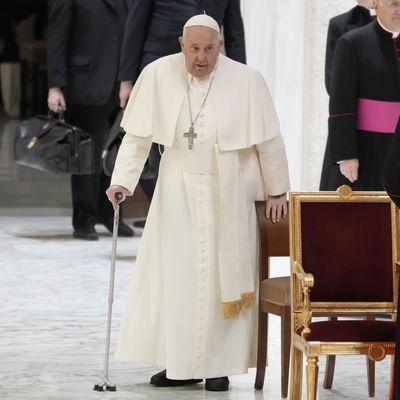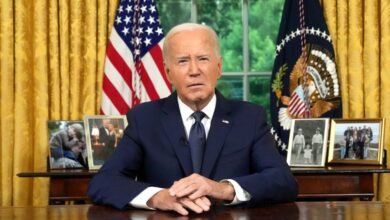

Pope Francis moving carefully.
Photo: Andrew Medichini/AP
In a move that will be exaggerated in its significance by both his traditionalist enemies and optimistic progressives within and beyond the Catholic Church, the Vatican has okayed the blessing of same-sex couples by priests. It’s getting far less attention, but the new position also green-lights the blessing of divorced and remarried couples. As the National Catholic Reporter explained, this step was taken by a Vatican agency under very clear guidance from Pope Francis:
While extremely narrow in scope, the Dec. 18 “declaration” from the powerful Dicastery for the Doctrine of the Faith may serve as the most concrete pastoral shift on the church’s stance toward gay couples in the church’s centuries’ long history.
The publication of the eight-page document, “Fiducia supplicans: on the pastoral meaning of blessings,” comes less than three months after Pope Francis had personally opened the door to such a possibility in response to five retired conservative Catholic cardinals who had written to the pontiff about whether such blessings might be possible.
That “open door” is indeed very narrow. The newly authorized blessings cannot be part of a formal Catholic liturgy; cannot be described as any sort of approved “civil unions”; and cannot resemble a marriage ceremony. I stress the limitations because there will be a natural tendency to conflate the new Vatican position with the beginning of a very rapid evolution toward marriage equality that has been evident in secular law and politics in the 21st century. Lest we forget, President Barack Obama, among many other U.S. liberals, was in the “Don’t call it marriage” camp on same-sex unions until May 2012.
But while public opinion and increasingly outdated cultural norms were the primary obstacle to the acceptance of marriage equality in the United States, there are vast institutional barriers to the Vatican going there. Most obviously, the many centuries of Catholic doctrine relating to marriage as a sacramental union of previously unwedded (other than widowed) men and women cannot be whittled away without an abrupt break that would roil an already divided and struggling global church. It would be at least as momentous a shift as the ordination of women or lifting the celibacy requirement for priests, and neither of those reforms is in sight.
Even if it were just a matter of adapting Catholic doctrine to changing times and cultural trends, Catholic lay opinion on same-sex marriage varies enormously by geography, as a 2020 Pew study found:
In the United States, about six-in-ten Catholics (61%) said in a 2019 survey that they favor allowing gays and lesbians to marry. Same-sex marriage became legal across the U.S. following a Supreme Court ruling in 2015 …
In Western Europe, large majorities of Catholics said in 2017 that they support legal same-sex marriage …
On the other hand, in almost all of the Central and Eastern European countries surveyed by the Center in 2015 and 2016, most Catholics oppose same-sex marriage. Nine-in-ten Catholics in Ukraine said same-sex marriage should be illegal, as did 66% of Catholics in Hungary and 62% of Catholics in Poland. Most nations in Central and Eastern Europe do not allow legal same-sex unions of any kind.
And in large swaths of the global South, simply being gay is culturally and even legally disfavored, adding to the divisive effect of any rapid movement by the Church on same-sex marriage in any particular direction. The new guidance from the Vatican appears designed to accommodate priests who wish to extend informal blessings instead of ignoring or explicitly condemning “irregular” unions, as the New York Times explains:
“This new declaration opens the door to nonliturgical blessings for same-sex couples, something that had been previously off-limits for bishops, priests and deacons,” said the Rev. James Martin, a prominent advocate for L.G.B.T.Q. Catholics, who has met frequently with Francis, a fellow Jesuit, and talked to him about the church’s need to better recognize L.G.B.T.Q. Catholics. “Along with many priests, I will now be delighted to bless my friends in same-sex unions.”
But again, this crack in the door will take a lot of force to widen, as the reaction of the conservative-leaning U.S. Conference of Bishops shows (per the Times):
“The church’s teaching on marriage has not changed, and this declaration affirms that, while also making an effort to accompany people through the imparting of pastoral blessings,” said Chieko Noguchi, the conference’s spokesperson.
Perhaps the best way to understand the new permission slip for blessings but not rituals is that it reflects the 87-year-old Francis’s sense of urgency to get past doctrinal disputes centered on sexuality in order to focus the Church on issues like economic inequality and global climate change. If he’s hoping for a truce in the culture wars, though, he’ll be as disappointed as his biggest fans and critics will likely be at his position on same-sex unions.
Source link




